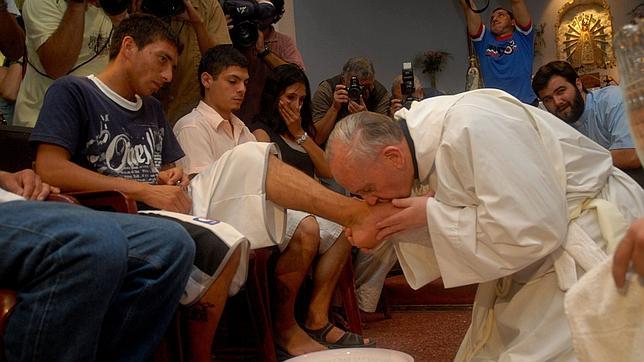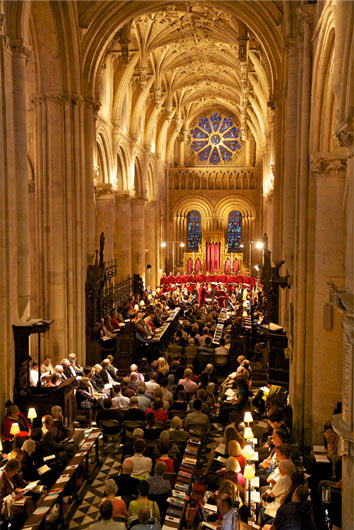About today, a normal and highly significant Thursday
Thursday, March 28th, 2013[ by Charles Cameron — remembering that there are two calendars, two times, the secular and the sacred, and that there’s more poetry, more depth of heart and thus intellect too, in the sacred calendar — a truth made known also to popes and monarchs ]
.

Cardinal Bergoglio, now Pope Francis, washes & kisses the feet of residents of a shelter for drug users, Maundy Thursday, 2008
It’s an extraordinary day, today, for myself as it happens, and more significantly for the world. Specifically, it is significant for poor and powerful alike, for it sets them in a proper relation to one another.
Today is Maundy Thursday, the day on which Christ’s Last Supper, which became and remains the prototype of the Catholic Mass, is remembered. His Last Supper would be closely followed by his crucifixion the next day, Good Friday, and resurrection on Easter Sunday.
After that final supper, Christ made a gesture which initially disturbed his close followers — he washed their feet, then instructed them to do the same.
His gesture repeats itself to this day.
**
Pope Francis, who as an archbishop had followed this practice by washing and kissing the feet of young people in drug shelters (image above) and AIDS clinics, is breaking with Vatican tradition — the pope washing the feet of priests in some major basilica in Rome — this year, by going to a youth prison today for the ceremony:
The Mass of the Lord’s Supper that Pope Francis will celebrate on Holy Thursday in the chapel of the Casal del Marmo Penitential Institute for Minors will be, by his express desire, very simple. Concelebrating with the Holy Father will be Cardinal Agostino Vallini, vicar general of the Diocese of Rome, and Fr. Gaetano Greco, chaplain of the Institute.
Around 10 girls and 40 boys will take part in the Mass. The Pope will wash the feet of 12 of them, who will be chosen from different nationalities and diverse religious confessions. The youth will also say the readings and the prayers of the faithful. Given the intimate nature of the pastoral visit, journalists will be restricted to the area outside the building and no live coverage will be transmitted.
That’s a slightly formal Vatican announcement of the occasion: “diverse religious confessions” in this case almost certainly includes Muslims and atheists or agnostics. Father Greco, the prison chaplain, is quoted as saying:
Only eight of our residents are Italian: six boys and two girls … The others are all foreigners. And most of them are Muslim. Then there are some who have no religious belief at all. Therefore many of them don’t even know who the Pope is. For this reason too, it was far from easy to explain to them the importance of the Pope’s visit.
A young Neapolitan who has been here for a while came to my help. He gathered them all together, to try to make them understand above all what the Pope’s act, which is an act of love for them, actually meant. I was upset for a moment by the first looks, that were either blank or only faintly curious about my enthusiasm. Then our friend broke the silence with that most classic of Neapolitan expressions: “Maronna mia, o Papa accà!” [good heavens! The Pope here!] and he ran his hand through his hair, his face betraying emotions mingled with happiness. At that very instant all the others, seeing his amazement, realized that it must really be something very special and began to question me. Little by little, I saw their enthusiasm growing.
Father Greco said of his young charges that the Pope’s visit “will make them see that their lives are not bound by a mistake, that forgiveness exists and that they can begin to build their lives again.”
**
This symbolic gesture, this washing of the feet, does indeed have enormous imaginative power, if we will allow it, to touch the heart and transform our behavior.
I’ve quoted this before, I know: it’s the account given by the man I know who, more than any other, prayed, lived, worked, and saw his great dream and hope accomplished in his lifetime — the overturning of the apartheid regime in S. Africa. For myself, it’s the heart of what he taught me: here, in his own words, Fr Trevor Huddleston CR describes how his own role in that drama began:
On Maundy Thursday, in the Liturgy of the Catholic Church, when the Mass of the day is ended, the priest takes a towel and girds himself with it; he takes a basin in his hands, and kneeling in front of those who have been chosen, he washes their feet and wipes them, kissing them also one by one. So he takes, momentarily, the place of his Master. The centuries are swept away, the Upper Room in the stillness of the night is all around him: “If I, your Lord and Master, have washed your feet, ye ought also to wash one another’s feet.” I have knelt in the sanctuary of our lovely church in Rosettenville and washed the feet of African students, stooping to kiss them. In this also I have known the meaning of identification. The difficulty is to carry the truth out into Johannesberg, into South Africa, into the world.
**
Earlier today, Queen Elizabeth II will have celebrated “the Royal Maundy” in the chapel of my old College and that of my mentor, Trevor Huddleston, at Oxford, Christ Church — our college chapel is also the cathedral of that great city.
The current Dean Of Christ Church, the Very Reverend Christopher Lewis, gave the BBC this historical detail:
The last time it happened here was in 1644 when Charles I was thrown out of London and welcomed in Oxford.
Here’s the glorious building where the ceremony will have taken place:
**
The Royal Maundy is celebrated by the monarch giving two purses to local pensioners — 83 men and 83 women this year since HM is 83 years old — a white purse containing sterling silver 1p, 2p, 3p and 4p pieces, and a red purse contained a £5 and a 50p coin commemorating the 60th anniversary of the Queen’s coronation in 1953.
Maundy Thursday commemorates the day of the Last Supper of Jesus Christ with the Apostles. The word ‘Maundy’ comes from the command or ‘mandatum’ by Christ at the Last Supper, to love one another.
The tradition of the Sovereign giving money to the poor dates from the thirteenth century. The Sovereign also used to give food and clothing, and even washed the recipients’ feet. The last monarch to do so was James II.
The recently retired Archbishop of Canterbury, Dr Rowan Williams, gives us a sense of the rich symbolism of the occasion:
It’s a curious survival, the Royal Maundy, but a touching one, looking back to the days when the monarch really was expected to be a bit like a priest for the nation – acting out the great symbols of faith on behalf of everyone. …
And that’s very much what the Royal Maundy is about. What we see today is only a shadow of what used to be done hundreds of years ago, when the monarch would actually do what Jesus did at the Last Supper and wash the feet of a number of poor people. Back in the Middle Ages, this meant that the King was just doing what priests and bishops often did, not only on Maundy Thursday but on many other occasions.
They didn’t all do it because they were lovely humble people – some were, and some definitely weren’t – but because they accepted one great truth that needed repeating over and over again, the one big thing that Christianity had brought into the world of human imagination.
And that was – and is – the truth that power constantly needs to be reminded of what it’s for. Power exists, in the Church or the state or anywhere else, so that ordinary people may be treasured and looked after, especially those who don’t have the resources to look after themselves. The Bible is crystal clear that this is the standard by which the gospel of Jesus judges the powerful of this world.
Not everyone would agree — but I believe the current Queen and the current Pope would — as would his predecessor, Benedict XVI. It bears repeating:
Power exists, in the Church or the state or anywhere else, so that ordinary people may be treasured and looked after, especially those who don’t have the resources to look after themselves.
**
Here is the text from St John’s gospel — the gospel that focuses its attention at the symbolic level — describing the original event [John 13.1-15]:
He riseth from supper, and laid aside his garments; and took a towel, and girded himself. After that he poureth water into a bason, and began to wash the disciples’ feet, and to wipe them with the towel wherewith he was girded.
Then cometh he to Simon Peter: and Peter saith unto him, Lord, dost thou wash my feet?
Jesus answered and said unto him, What I do thou knowest not now; but thou shalt know hereafter.
Peter saith unto him, Thou shalt never wash my feet.
Jesus answered him, If I wash thee not, thou hast no part with me.
Simon Peter saith unto him, Lord, not my feet only, but also my hands and my head.
Jesus saith to him, He that is washed needeth not save to wash his feet, but is clean every whit: and ye are clean, but not all. For he knew who should betray him; therefore said he, Ye are not all clean.
So after he had washed their feet, and had taken his garments, and was set down again, he said unto them, Know ye what I have done to you? Ye call me Master and Lord: and ye say well; for so I am. If I then, your Lord and Master, have washed your feet; ye also ought to wash one another’s feet. For I have given you an example, that ye should do as I have done to you.
**
Here finally, for sheer beauty, is the great 16th century Spanish composer Tomás Luis de Victoria‘s First Lamentation for Maundy Thursday, sung by the Tallis Scholars in the chapel of Merton College, Oxford — just around the corner from Christ Church:



